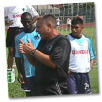Interesting
A true impact position
By Terry Bowden, Yahoo! Sports
April 22, 2007
Now that spring football practice is winding down, you would think it’s about time to let the boys relax a little bit and get away from the game.
But this couldn't be further from the truth.
Now is the time that the true offseason begins. Now is the time that is going to make or break the success of your team. Now is the time that the strength and conditioning coach becomes the most important coach on your staff.
Actually, the s/c coach has been the most important coach on your staff for some time now – you just didn't know it. During the twelve months of the calendar year, no college coach spends more time with the athletes than the s/c coach. He is responsible for not only the strength and conditioning of every single athlete on the team but also each player's speed development, flexibility, body weight and even football-related skills and agilities. Because he is with the players so much throughout the year, he also must wear the hats of a father, psychologist, enforcer and even a head coach.
Because of changes in the NCAA rules that determine how much time a coach can spend with student-athletes, the s/c coach has the ability to develop a much closer relationship with players than the average position coach. He has the unique opportunity to work with every player in the program from the All-American to the average walk-on, whereas the position coach may not even know the name of everyone on the team.
The tight end coach, for example, might coach only three guys and, by rule, can be with them only five months of the year and for a very limited amount of time each day. But the s/c coach will have more than 100 guys eight hours per week for seven months of the year. It's not hard to see which coach has the ability to have a greater impact on the team.
Years ago, when I first became a head coach, things were quite different regarding the amount of time assistant coaches could be with players. There were no in-season or off-season regulations limiting the hours coaches could spend with athletes teaching them football or football-related drills. During the season and in the spring, meetings and practices lasted as long as it took to get things done. And in the offseason, other than the rule that they couldn't put on the pads and butt heads, coaches could be with players about as long as they wanted.
Shoot, back in the early '80s I don't think a day went by, except during recruiting, that I didn't spend a little bit of time with some of my players getting them ready to play football.
More importantly, when the athlete was not doing a good job or giving the effort that he needed to give in the weight room, his position coach was right there to motivate and push him if he needed a little extra incentive. Back in the day, I'd see assistant coaches go by the dorm room at 5 in the morning just to make sure a player didn't miss his daily workout.
Now it's up to the s/c coach to be that enforcer. He must be just as tough on the players and carry just as big of a stick as the assistant coaches used to do.
The critical point I'm trying to make is that the s/c coach is in the best position today to be proactive in the development of the athlete by motivating him and reinforcing what he does do in the offseason. On the other hand, the assistant coach can be only reactive to a problem by punishing a kid for what he does not do – perhaps even demoting him or keeping him out of games.
If you're trying to build a championship team, praising and reinforcing an athlete for getting stronger and in better shape is a lot more effective than demoting or not playing an athlete for not getting stronger or in better shape.
The s/c coach now also must take the lead in setting the tone for the mental toughness of the team. The tougher he is on players every day in the offseason, the tougher they will be on the football field. A great team must be talented and mentally tough. You can recruit talent, but you must develop toughness.
Winning is an every-day thing. You don't just wake up Saturday morning and decide you are going to play the game of your life. No, it is decided every single morning of the year when you either give a great day of work in the weight room and the practice field or you do not.
Today, that responsibility falls on the strength and conditioning coach. You'd better have a good one.


4 Comments:
It's not always counting reps and sets...work to rest ratio...or energy systems.
Great comments for S&C coaches, and kudos to Terry Bowden.
TC
Many S&C Coaches work grueling hours with little resources, low pay, working with hundreds of different athletes, different sports etc each week. It's no wonder guys burnout. Great article that hopefully opens peoples eyes to the importance of s&c coaches.
Colin Cooley
The S&C coaches that "work with hundreds of different athletes" are making big $$ and are almost as famous as the athletes they train. The "burnout's" are looking for the quick bucks not taking the time to understand the individual. If they can't find the resources they are either not looking in the correct place, to stubborn or just lazy. In a team, no one person is more important than the next. The S&C coach I believe just gets over looked too often. Why?
I always listened when my s/c coach talked. He seemed the wisest.
home therapy
Post a Comment
<< Home